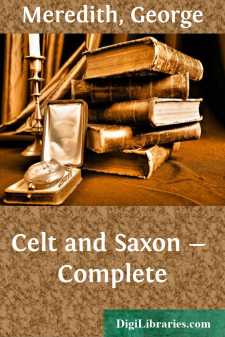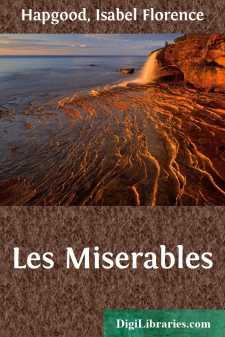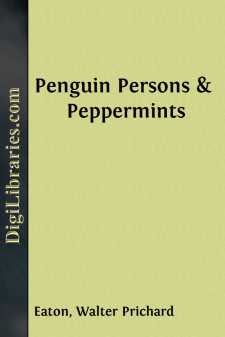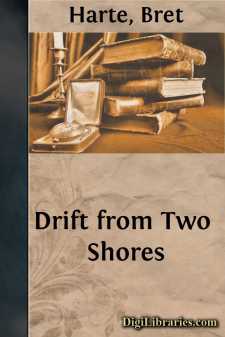Literary Collections
- American 84
- Ancient, Classical & Medieval 14
- Asian 1
- Australian & Oceanian 1
- Canadian 55
- Continental European 121
- English, Irish, Scottish, Welsh 179
- Essays 160
- General 24
- Letters 46
- Middle Eastern 1
Literary Collections Books
Sort by:
by:
George Meredith
CHAPTER I. WHEREIN AN EXCURSION IS MADE IN A CELTIC MIND A young Irish gentleman of the numerous clan O'Donnells, and a Patrick, hardly a distinction of him until we know him, had bound himself, by purchase of a railway-ticket, to travel direct to the borders of North Wales, on a visit to a notable landowner of those marches, the Squire Adister, whose family-seat was where the hills begin to lift...
more...
CHAPTER I—M. MYRIEL In 1815, M. Charles-Francois-Bienvenu Myriel was Bishop of D—— He was an old man of about seventy-five years of age; he had occupied the see of D—— since 1806. Although this detail has no connection whatever with the real substance of what we are about to relate, it will not be superfluous, if merely for the sake of exactness in all points, to mention here the various...
more...
CERES’ RUNAWAY One can hardly be dull possessing the pleasant imaginary picture of a Municipality hot in chase of a wild crop—at least while the charming quarry escapes, as it does in Rome. The Municipality does not exist that would be nimble enough to overtake the Roman growth of green in the high places of the city. It is true that there have been the famous captures—those in the Colosseum,...
more...
It is not a little unfortunate that no one can attempt the essay form nowadays, more especially that type of essay which is personal, reminiscent, “an open letter to whom it may concern,” without being accused of trying to write like Charles Lamb. Of course, if we were ever accused of succeeding, that would be another story! There is, to be sure, no doubt that the gentle Elia impressed his form and...
more...
by:
Henry Coppee
Chapter I. The Historical Scope of the Subject. . . . . . . . . . Literature and Science. There are two words in the English language which are now used to express the two great divisions of mental production—Science and Literature; and yet, from their etymology, they have so much in common, that it has been necessary to attach to each a technical meaning, in order that we may employ them without...
more...
This was not my first visit to the state capital. Indeed, some of that recondite knowledge, in which I took a pride, had been gained on the occasions of my previous visits. Rising and dressing early, I beheld out of the car window the broad, shallow river glinting in the morning sunlight, the dome of the state house against the blue of the sky. Even at that early hour groups of the gentlemen who made...
more...
by:
Bret Harte
THE MAN ON THE BEACH He lived beside a river that emptied into a great ocean. The narrow strip of land that lay between him and the estuary was covered at high tide by a shining film of water, at low tide with the cast-up offerings of sea and shore. Logs yet green, and saplings washed away from inland banks, battered fragments of wrecks and orange crates of bamboo, broken into tiny rafts yet odorous...
more...
Grateful acknowledgment for permission to include the stories and other material in this volume is made to the following authors, editors, publishers, and copyright holders: To The Pictorial Review Company and Miss Edwina Stanton Babcock for permission to reprint "The Excursion," first published in The Pictorial Review; to The Century Company and Mr. Thomas Beer for permission to reprint...
more...
by:
Charles Reade
CHAPTER I. A young lady sat pricking a framed canvas in the drawing-room of Kent Villa, a mile from Gravesend; she was making, at a cost of time and tinted wool, a chair cover, admirably unfit to be sat upon—except by some severe artist, bent on obliterating discordant colors. To do her justice, her mind was not in her work; for she rustled softly with restlessness as she sat, and she rose three...
more...
by:
Ralph Connor
CHAPTER I THE FOOTHILLS COUNTRY Beyond the great prairies and in the shadow of the Rockies lie the Foothills. For nine hundred miles the prairies spread themselves out in vast level reaches, and then begin to climb over softly rounded mounds that ever grow higher and sharper till, here and there, they break into jagged points and at last rest upon the great bases of the mighty mountains. These rounded...
more...











